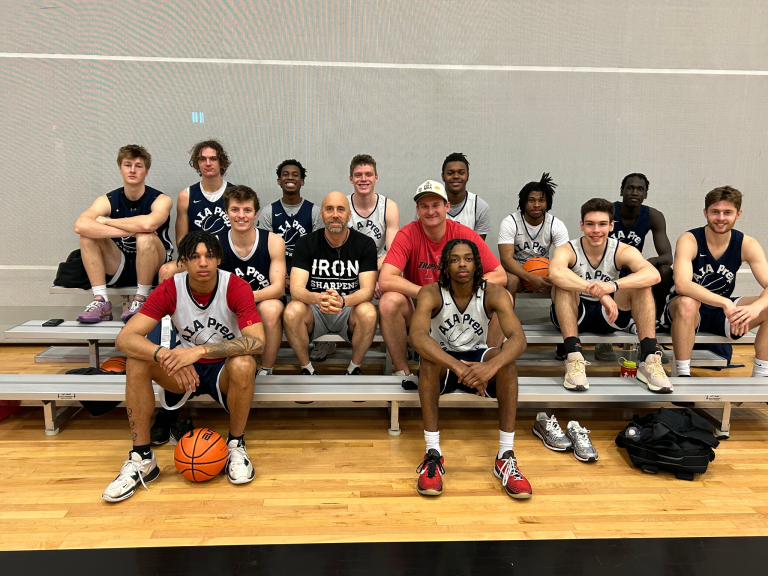Article
Set Your Goals, Guard Your Identity
Separating who you are from what you do
Ivey Whalen
never miss a play
Get weekly articles on sport culture, relationships, and identity.
Athlete, you’re probably familiar with the general feelings of excitement surrounding the start of a new season. You’ve got new gear, your body feels great and you have a new team with new goals — talk about a fresh start!
I was an ambitious goal-setter as a college athlete, especially at the beginning of the season. The fresh start excited me. I couldn’t wait to hit the ground running at practice, to set goals and crush them.
But as the season progressed, I often found myself in the opposite scenario — I wasn’t crushing my goals. The weight of achieving those goals was actually crushing me.
Growing up, I unknowingly tied my identity to my performance in volleyball. I wasn’t aware of this until I came to college and struggled to get playing time.
Up until that point, I had always been on the court. I was the impact player, so when I found myself on the bench as a freshman, I experienced a mini identity crisis.
I remember thinking, I’m a volleyball player and I’m not playing. I only found value in contributing on the court, and I had set goals heading into my first year with this type of contribution in mind. I couldn’t even get to work at those goals without playing time, so I’d work my butt off at practice trying to earn a starting spot.
My identity as a volleyball player was slowly slipping away, and all of my inner dialogue revolved around one central question: Who am I if I don’t start to play?
1 Corinthians 4:3-4 (ESV)
“But with me it is a very small thing that I should be judged by you or by any human court. In fact, I do not even judge myself. For I am not aware of anything against myself, but I am not thereby acquitted. It is the Lord who judges me”
During my sophomore year, I began learning what it means to have a personal relationship with Jesus Christ and to find my identity in Him. The moment you believe in Jesus, God adopts you into His family. You become a child of God.
Unlike identity in sport, your identity as His child is secure, unchanging and not based on your performance, but solely on Christ’s performance. His life of perfect obedience gets attributed to you, as if it were your own.
Now when God looks at you, He sees His Son, Jesus. Nothing you achieve (or don’t achieve) can change that.
Not many people clung to and lived out this truth better than the apostle Paul. In his first letter to the Corinthians, he writes, “But with me it is a very small thing that I should be judged by you or by any human court. In fact, I do not even judge myself. For I am not aware of anything against myself, but I am not thereby acquitted. It is the Lord who judges me” (1 Corinthians 4:3,4 ESV).
In his book The Freedom of Self-Forgetfulness, pastor and theologian Tim Keller paraphrases what Paul wrote as, “I don’t care what you think. I don’t even care what I think. I only care about what the Lord thinks.” His point is that every person has three choices of where they can find their identity: in what others think, in what we think about ourselves, or in what God thinks about us.
Now when God looks at you, He sees His Son, Jesus. Nothing you achieve (or don’t achieve) can change that.
After finding my identity in Christ, I wish I could say I chose to think about what God thought about me 100 percent of the time from that point on. I wish I could say with as much confidence as Paul, “I only care about what the Lord thinks.”
The reality is I still struggled with the weight of performance and achievement throughout my time in college. I still walked a fine line between setting goals and setting my identity in those goals. I still cared what others thought about me, and I still cared what I thought about me.
The difference, however, was because of my new relationship with God, I knew I had the Holy Spirit to remind me of the truth of who I was in Christ whenever I allowed my identity to wander elsewhere.
I’m not saying you shouldn’t set goals for yourself. You should. I don’t know of any successful businesses without a vision statement and goals to move them closer to that vision. Goals are especially important in sport. They provide direction and help you develop both as a team and individual.
The problem is when accomplishing those goals becomes the thing that justifies you. That’s a weight no one can carry. God has already justified us in Christ. We now have an identity that our wandering hearts can find rest and satisfaction in, one that is based solely on God’s unwavering opinion toward us: “You are My beloved Son; with You I am well pleased” (Mark 1:11).
Ivey Whalen graduated from Northwestern University with a degree in Journalism. During her time at NU she was also a member of the volleyball team. Ivey now works as an intern with Athletes in Action in Chicago.
READ THE LATEST
Where sport culture, relationships, character, identity, and faith collide.

